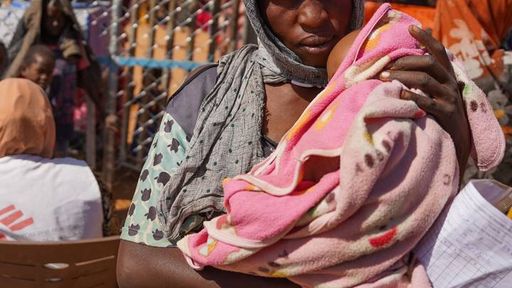Sleep no longer envelops 37-year-old Hawa* in its calming embrace. Each time she closes her eyes, visions of the dead return to haunt her.
Her journey from el-Fasher to the Zamzam refugee camp – and finally across the border to Chad – traces a map of Sudan's expanding violence that has displaced millions.
"We left Zamzam because of the bombing," she narrates, describing how 55 cars formed a convoy to Kabkabiya, escorted by armed men grimly aware of the dangers that lay ahead.
At a militia checkpoint, what they had been apprehending came true.
"If you want to fight with us, we are ready, but please let them go," the escorts pleaded with the militia.
The answer came in bullets and blades.
"They started killing our armed escorts with knives and guns. They killed all of them," Hawa recounted to Médecins Sans Frontières (MSF) teams who received them in Chad. "I can't sleep. I see dead people in front of my eyes."
Another survivor in the convoy, a 26-year-old woman, describes how "blood was flowing like water".
The massacre left Hawa’s mind scarred. "For four days after Kabkabiya, I lost my memory. I couldn't even remember my children's names," she says.
Her six children, like many others, fled the carnage despite the danger of being gunned down as well.

"We found them two days later," says Hawa, who sought sanctuary in Tine, eastern Chad.
These personal horrors reflect a systematic campaign of violence that Claire San Filippo, MSF’s emergency coordinator for Sudan, calls catastrophic.
"This is a conflict that is killing, maiming and raping, day in and day out," she tells TRT Afrika. "It needs to stop."
Brutal tool of war
The systematic nature of these atrocities extends beyond killings.
"Sexual violence is really pervasive in this conflict," says Filippo. "Women and girls are being raped very often by multiple perpetrators."
A 17-year-old survivor describes her assault with devastating clarity. "They raped us right there on the road, in public. There were nine RSF men. Seven of them raped me," she says.
Her only wish after the ordeal? "I wanted to lose my memory."
The targeting extends to boys and young men. Women describe fighters forcing them to undress their children to verify their gender. "When they see it's a boy, they kill them," one refugee explains.
Her cousin was among 32 men executed in a single attack.
In Murnei, West Darfur, a mother barely saved her infant son. "Someone said, 'I will kill your son with a knife.' I started crying and begged him not to kill my baby, and he let me go. But they raped my sister," she recalls.

For Aziza*, her nursing certificate – once a source of pride – almost became a death warrant when RSF fighters stopped her convoy two months ago, they singled her out.
"You want to cure the enemy?" they shouted, burning her certificate before raping her. "They raped me because of my certificate," she told MSF.
The assault on Aziza took place after a year of recurrent tragedies. In June 2024, she returned home to one shock after another. "A bomb landed on our house. My mother was the only one inside. I tried to take her to the hospital, but she died before we arrived," she says.
Her father died shortly after. Orphaned and traumatised, she convulses at the thought of another setback. "I want protection; I am not waiting here to be raped again," she says.
At breaking point
MSF has established temporary facilities in Tine, providing medical care and psychological support to refugees. But Filippo acknowledges that the response is "grossly insufficient" as the number of people needing help continues to rise.
With camps at capacity and the rainy season approaching, which typically brings the additional threat of vector-borne diseases such as malaria and dengue, the situation grows increasingly desperate with each passing day. Food, shelter, sanitation and medical care remain critically scarce.
The UN reports that over 860,000 Sudanese have crossed into Chad, each carrying stories of what Filippo describes as "harrowing violence and horrific hardship". The psychological trauma is overwhelming.
For these survivors, only one solution exists: peace in Sudan. For now, it's just a dream. (Remove it)
*Some names have been changed to protect identities



















